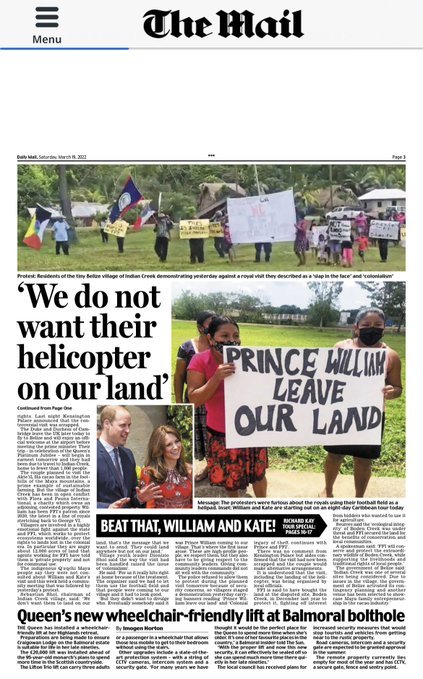Belize: Indigenous folks accuse Kate and William of promoting Britain’s colonial legacy. Held “Leave our Land” protests against the ‘Royals.’


Prince William and his wife Kate have been ‘canceled’ by Belizean protestors who accused the Duke and Duchess of Cambridge of continuing Britain’s “colonial legacy”.
The royals were set to arrive in Belize and visit the village of Indian Creek — a small community home to less than 1,000 people — so they could inspect the Akte’iL Ha sustainable cacao plantation, but the visit was cut from their Caribbean tour after a demonstration against the royal pair.
Protestors held an array of signs next to Belize and local flags, with slogans such as “this is not crown land”, “this is Indian Creek property”, “Prince William leave our land”, and “Colonial legacy of theft continues with Prince & FFI”.
One of the disgruntled protestors said “these are high-profile people, we respect them” — despite the confrontational nature of the demonstration — and their opposition to the visit is believed to be tied to a land dispute and concerns the royals’ helicopter would be landing on their football pitch, the Daily Mail reports.
The police had prohibited villagers from protesting on Sunday when the royals’ initially planned to visit the village, so they instead protested on Friday in response to Flora and Fauna International (FFI), a charity that Prince William is the patron of and which recently purchased the land adjoining the disputed territory.
The land in question, Boden Creek, had been bought by FFI in December 2021 in an effort to conserve it from development, but locals have become upset with the purchase, claiming they have been denied access to 12,000 acres of the land which they view as their ancestral property.
The locals insist that Prince William must take responsibility for the charity and reopen the land to local people.
The second major grievance from the indigenous Q’eqchi Maya people is that they claim they were not consulted about the royals’ visit to their village, which they see as a form of disrespect — with some going as far to suggest it was a form of “colonialism”.
“For us it really hits right at home because of the treatment. The organiser said we had to let them use the football field and that people were coming to our village and it had to look good”, Q’eqchi Maya youth leader Dionisio Shol said.
“But they didn’t want to divulge who. Eventually, somebody said it was Prince William coming to our village. That’s where the first issue arose. These are high-profile people, we respect them, but they also have to be giving respect to the community leaders. Giving community leaders commands did not sit well with the community,” Shol continued.
“We don’t want them to land on our land, that’s the message that we want to send. They could land anywhere but not on our land,” Sebastian Shol, the chairman of the Indian Creek village, added.
The Government of Belize have released a statement in response, saying: “Indian Creek was one of several sites being considered. Due to issues in the village, the Government of Belize activated its contingency planning and another venue has been selected to showcase Maya family entrepreneurship in the cacao industry”.
The Royals are expected to continue their eight-day tour of Belize, Jamaica, and the Bahamas to celebrate Queen Elizabeth II’s Platinum Jubilee — marking 70 years on the throne for the monarch.
The Queen still reigns as monarch in all three countries, which are among the 14 Commonwealth realms including the United Kingdom, Canada, Australia, and New Zealand where she is head of state.
Source & Images: https://www.breitbart.com/europe/2022/03/20/prince-william-leave-our-land-royals-caribbean-trip-literally-cancelled-by-anti-colonial-protestors/
DISCLAIMER: The author is solely responsible for the views expressed in this article. The author carries the responsibility for citing and/or licensing of images utilized within the text.
